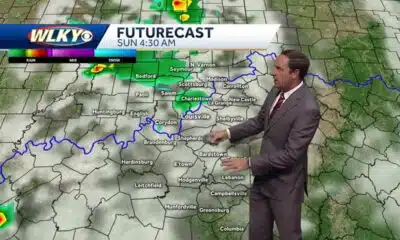News from the South - Arkansas News Feed
Higher education bill receives initial approval from Arkansas lawmakers
Higher education bill receives initial approval from Arkansas lawmakers
by Antoinette Grajeda, Arkansas Advocate
March 11, 2025
Arkansas lawmakers on Monday advanced legislation that would overhaul the state’s higher education system by making changes to its funding model, scholarships, course credits and the admissions process, among other things.
The Joint Education Committee debated Arkansas ACCESS for more than five hours Monday. The legislation was filed as two identical bills in the House and Senate last month.
While lawmakers voiced support for initiatives such as doubling the first-year Arkansas Academic Challenge award from $1,000 to $2,000, there was bipartisan pushback on other provisions, most notably a prohibition on granting excused absences to public school students who participate in political protests or attempts to influence legislation or other governmental policymaking.
Committee members said they were concerned this would take away local control and educational opportunities. Rep. DeAnn Vaught, R-Horatio, said she was worried this would prevent students, like one that helped her present a Holocaust-related bill in committee in 2021, from participating in the lawmaking process.
Little Rock Central High students protest alumna Sarah Huckabee Sanders’ legislative agenda
Senate sponsor Sen. Jonathan Dismang, R-Searcy, said students aren’t banned from participating in such events, it would just be noted as an unexcused absence. Vaught said that could negatively impact their education because generally students aren’t allowed to make up work they missed without an unexcused absence.
House sponsor Rep. Matthew Shepherd, R-El Dorado, said student protests have been an issue across the country, and the provision places an emphasis on going to school to learn.
“They are there to get an education, and they’re not there to have a teacher push them into some type of advocacy or political protest or in some type of attempt to influence legislation,” Shepherd said. “Again, the concern is that who decides what is appropriate for that student to advocate for or not? I think we’re doing our school districts a favor by including this because students are there to learn.”
Little Rock Central High School student Ava Kate White said she opted to miss school to testify against Arkansas ACCESS Monday because it may be her last opportunity to do so and not be labeled truant.
The “aspiring journalist” argued the 123-page bill “further suppresses the voices of the youth” and would pave the way for more harmful laws. She urged lawmakers to look at the statue of the Little Rock Nine on the Capitol grounds as they considered the impacts of the proposed legislation.
“They did not make history by letting themselves be silenced,” White said. “They did not make lasting impacts on the world by giving up when they were denied their rights. These nine brave individuals changed society before they were even of age to vote.”
When the committee meeting resumed late Monday afternoon following a midday recess, the bills’ sponsors presented an amendment that still prohibits excused absences for political protests, but permits public schools to allow excused absences for social or public policy advocacy or attempts to influence legislation or other governmental policymaking with written parental consent.
School districts would be required to provide an annual report by June 30 to the education department that includes absences requested and granted, and purposes for the absences.
The Joint Education Committee adopted the amendment, which members of the public noted did not amend the section of the legislation that would still prohibit these excused absences for college students at state-supported institutions of higher education.
The committee also adopted another amendment that would allow a new scholarship program for concurrent credit courses to apply to virtual courses. Republican lawmakers voiced concern that the original proposal to restrict funds to in-person instruction would negatively affect rural schools that often rely on virtual instruction.
Dismang said he shared those concerns, but said the COVID-19 pandemic highlighted the importance of in-person learning. The bills’ sponsors said the issue was brought to their attention over the weekend, which is why they had an amendment ready to present Monday morning.
Stakeholder voices
Arkansas ACCESS would also change the composition and size of a variety of boards and committees. In response to questions by lawmakers about why groups like the Arkansas Education Association and the Rural Ed Association were removed from their positions on various boards, Dismang said the bill eliminates “without bias” entities that were not statutorily created. The bill allows for the appointment of other stakeholders not specifically identified in legislation, he said, so adding these groups could be included that way.
Bills flesh out Arkansas governor’s higher-education overhaul proposal
Sen. Reginald Murdock, D-Marianna, who said Arkansas ACCESS is a “real-life example” of why inclusion and diversity are necessary in conversations, asked if anyone from the Legislature’s minority party was involved in the development of the bill before it was filed.
“As a legislator, I had discussions with a number of individuals, primarily related to higher education [with] differing backgrounds,” Shepherd said. “I don’t know what their political affiliations may have been. You may not like the answer…”
“No, no, you’re gaming me, [Rep.] Shepherd,” Murdock said. “That’s not right what you’re doing now. No, we ain’t going to do that.”
The exchange prompted cheers and applause from the crowd, which committee chairman Rep. Keith Brooks, R-Little Rock, said could not continue.
Most Republicans probably didn’t see the bill until it was filed last month, Shepherd said, but since then, conversations have continued and input has been asked for.
“And then we came back and filed an amendment to it,” he said. “You may not like the answer, you may not like the answer, but the fact is that we took a lot of time and effort. You may not like what’s in the bill, but don’t demean the process and don’t demean us as far as the work that we do.”
Part of the bill that some have raised concerns about is a section focused on “rejecting discrimination and indoctrination in postsecondary education.” Daisy Onoriobe, a Philander Smith University student who attended a press conference opposing Arkansas ACCESS outside the Capitol Monday, said it’s “extremely unclear” how the bill’s provision will affect Arkansas colleges.
“How does this affect student organizations, scholarships and support centers for women,” Onoriobe asked. “Can staff tell students to stop making racist comments? How does this affect hiring diverse liaisons for colleges? Diversity, equity and inclusion efforts are not a problem. They’re good for Arkansas.”
Inside the committee room, Rep. Diana Gonzales Worthen, D-Springdale, said she’s heard concerns from higher ed employees who are also worried about the bill’s DEI language.
“I think it’s unintentional, but I think it’s having a chilling effect,” she said.
Shepherd said he didn’t think the bill would have that effect, noting that the bill’s specific reference to DEI concerns the accreditation process, a section that Shepherd said was amended at institutions’ request.
“We’re not trying to chill the discussion of legitimate topics within the curriculum of a class,” he said. “…We’re trying to provide those protections and also we tried to give a lot of thought to make sure that this language applies even-handedly across the board, regardless of what may be the viewpoint of the day or what may be the political whims at that point in time.”
Both bills, which were voted on separately by members of the House and Senate, passed on split voice votes.
Reporter Tess Vrbin contributed to this story.
YOU MAKE OUR WORK POSSIBLE.
Arkansas Advocate is part of States Newsroom, a nonprofit news network supported by grants and a coalition of donors as a 501c(3) public charity. Arkansas Advocate maintains editorial independence. Contact Editor Sonny Albarado for questions: info@arkansasadvocate.com.
The post Higher education bill receives initial approval from Arkansas lawmakers appeared first on arkansasadvocate.com
News from the South - Arkansas News Feed
NW Arkansas Championship expected to bring money to Rogers
SUMMARY: The Northwest Arkansas Championship in Rogers is more than a golf event; it significantly boosts the local economy. Drawing thousands annually, it brings steady crowds benefiting restaurants, shops, and service providers. Businesses report increased sales, especially in food and hydration products, with parking lots near the course filling quickly. The Rogers Chamber estimates the tournament injects around $14 million into the local economy, supporting small businesses. Starting tomorrow with a 5K event at the LPGA, this week-long tournament is a dependable source of customer traffic and highlights Rogers’ growth as a regional hub.
Rogers businesses make money off the LPGA’s NW Arkansas Championship.
40/29 is your home for Northwest Arkansas and the River Valley breaking news and weather. For your latest Northwest Arkansas and the River Valley news and weather visit: https://www.4029tv.com/
For licensing inquiries: https://www.4029tv.com/licensing
News from the South - Arkansas News Feed
Arkansas medical marijuana sales on pace for record year
SUMMARY: Arkansas medical marijuana sales are on track for a record year, with patients spending over $193 million from January to August 2025—more than $10 million higher than last year. The state currently has 109,000 active patient cards, purchasing over 52,000 pounds of cannabis products. Daily sales average around $800,000, generating more than $21 million in taxes this year. A new law directs part of this tax revenue to combat food insecurity, including eliminating school lunch debt statewide. Since 2019, Arkansas patients have spent over $1.5 billion on medical marijuana, with the state collecting more than $105 million in taxes.
Arkansas medical marijuana sales on pace for record year 40/29 is your home for Northwest Arkansas and the River Valley …
News from the South - Arkansas News Feed
Group in lawsuit say Franklin county prison land was bought before it was inspected
SUMMARY: A group filed a complaint against the Franklin County Prison project, claiming the land was purchased before proper inspection, resulting in unsuitable property acquisition and wasted taxpayer money. A study cited by State Senator Brian King revealed the site cannot supply adequate water for even one home, let alone a 3,000-bed prison. Despite ongoing prison overcrowding and the need for a new facility, concerns remain about the project’s viability. Lawmakers discussed the issue, highlighting overcrowding and early release of violent offenders due to lack of space. The Franklin County Prison project aims to build a 3,000-bed facility, but its future is uncertain amid these challenges.
Group in lawsuit say Franklin county prison land was bought before it was inspected
40/29 is your home for Northwest Arkansas and the River Valley breaking news and weather. For your latest Northwest Arkansas and the River Valley news and weather visit: https://www.4029tv.com/
For licensing inquiries: https://www.4029tv.com/licensing
-
News from the South - North Carolina News Feed6 days ago
Reagan era credit pumps billions into North Carolina housing | North Carolina
-
News from the South - Alabama News Feed6 days ago
Amid opposition to Blount County medical waste facility, a mysterious Facebook page weighs in
-
News from the South - Kentucky News Feed6 days ago
3 states push to put the Ten Commandments back in school – banking on new guidance at the Supreme Court
-
News from the South - South Carolina News Feed6 days ago
South Carolina’s Tess Ferm Wins Miss America’s Teen 2026
-
News from the South - West Virginia News Feed7 days ago
National Grandparents Day (9-7-25) and the special bond shared with their grandchildren
-
Local News6 days ago
Duke University pilot project examining pros and cons of using artificial intelligence in college
-
News from the South - Missouri News Feed5 days ago
1587 Prime gives first look at food, cocktail menu ahead of grand opening in KC
-
News from the South - Arkansas News Feed5 days ago
‘One Pill Can Kill’ program aims to reduce opioid drug overdose








































